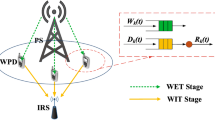Abstract
With the rapid development of wireless network technology, energy saving has become a very important topic to build a green network in wireless networks. Due to the time-varying characteristics of the channel, it is possible to obtain a higher utilization for energy by using the channel with good state in wireless communications. From the view of the data transmission energy consumption of the whole wireless network, this paper proposes an expected energy consumption minimization strategy (E2CMS) for data transmission based on the optimal stopping theory. Considering the maximum transmission delay and a given receiving power, E2CMS delays data to transmit until the best expected channel state is detected. In order to solve the problem, firstly, we construct an energy consumption minimization problem with quality of service constraints. Then, we prove that E2CMS is a pure threshold strategy by the optimal stopping theory and obtain the power threshold by solving a fixed-point equation using backward induction. Finally, simulations are performed in a typical small-scale fading channel model. E2CMS is compared with a variety of different transmission scheduling strategies. The results show that E2CMS has lower average energy consumption for per unit data and significantly improves the network performance.







Similar content being viewed by others
References
Bhuiyan MZA, Wu J, Wang G, Wang T, Hassan M (2017) e-Sampling: event-sensitive autonomous adaptive sensing and low-cost monitoring in networked sensing systems. ACM Trans Auton Adapt Syst 12(1):1–29
Castiglione A, D’Arco P, De Santi A, Russo R (2017) Secure group communication schemes for dynamic heterogeneous distributed computing. Future Gener Comput Syst 74:313–324
Ferguson T (2006) Optimal stopping and applications. http://www.math.ucla.edu/tom/Stopping/Contents.html
Freeman PR (1983) The secretary problem and its extensions: a review. Int Stat Rev 51(51):189–206
Jing Z, Chen D, Nguyen HV et al (2014) Cross-layer aided energy-efficient opportunistic routing in Ad Hoc networks. IEEE Trans Commun 62(2):522–535
Kohan M, Khotanlou H, Nassiri M (2013) An efficient mechanism for data rate adaptation in wireless LAN’s. Adv Comput Sci Int J 2(3):19–25
Li CP, Neely MJ (2007) Energy-optimal scheduling with dynamic channel acquisition in wireless downlink. In: The 46th IEEE conference on decision and control, pp 1140–1147
Lin C, Tian Y, Yao M (2011) Green network and green evaluation: energy conservation mechanism, model and evaluation (in Chinese). J Comput 34(4):593–612
Liu B, Lin C, Jiang X et al (2008) Performance analysis of sleep scheduling schemes in sensor networks using stochastic Petri net. In: Proceedings of the international conference on communications (ICC), pp 4278–4283
Peng Y, Wang G, Huang S et al (2016) Optimization strategy of data transmission energy consumption based on optimal stopping theory in mobile networks (in Chinese). J Comput 39(6):1162–1175
Poulakis MI, Panagopoulos AD, Constantinou P (2013) Channel-aware opportunistic transmission scheduling for energy-efficient wireless links. IEEE Trans Veh Technol 62(1):192–204
Qin X, Berry R (2003) Exploiting multiuser diversity for medium access control in wireless networks. IEEE INFOCOM, San Francisco, pp 1084–1094
Shen X, Agrawal S (2006) Kernel density estimation for an anomaly based intrusion detection system. In: International conference on machine learning, models, technologies and applications, Las Vegas, pp 161–167
Simon MK, Alouini MS (2005) Digital communications over fading channels. Wiley, Hoboken
Van Phan C (2014) A game-theoretic framework for opportunistic transmission in wireless networks. In: Proceedings of the 2014 IEEE fifth international conference on communications and electronics (ICCE 2014), Danang, pp 150–154
Wang L, Wong K-K, Jin S, Zheng G, Heath RW (2018) A new look at physical layer security, caching, and wireless energy harvesting for heterogeneous ultra-dense networks. IEEE Commun Mag 56(6):49–55
Weng C, Chen C, Chen P et al (2013) Design of an energy-efficient cross-layer protocol for mobile ad hoc networks. IET Commun 7(3):217–228
Yang W, Wang G, Bhuiyan MZA, Choo K-KR (2017) Hypergraph partitioning for social networks based on information entropy modularity. J Netw Comput Appl 86:59–71
Yue G, Zhou X, Wang X (2004) Performance comparisons of channel estimation techniques in multipath fading CDMA. IEEE Trans Wirel Commun 3(3):716–724
Zhang F, Antonio FA, Wang L et al (2012) Network energy consumption system model and energy efficiency algorithm. J Comput 35(3):603–615
Zheng D, Ge W-Y, Zhang J-S (2009) Distributed opportunistic scheduling for ad hoc networks with random access: an optimal stopping approach. IEEE Trans Inf Theory 55(1):205–222
Zhou Z, Dong M, Ota K, Wang G, Yang L (2015) Energy-efficient resource allocation for D2D communications underlaying cloud-RAN based LTE-A networks. IEEE Internet Things J 3(3):428–438
Funding
This study was funded by the National Natural Science Foundation of China under Grant Nos. 61562006 and 61632009, 61772233, in part by the Natural Science Foundation of Guangxi Province under Grant No. 2016GXNSFBA380181.
Author information
Authors and Affiliations
Corresponding authors
Ethics declarations
Conflict of interest
We declare that we have no conflict of interest.
Ethical approval
This article does not contain any studies with human participants or animals performed by any of the authors.
Additional information
Communicated by A. Di Nola.
Publisher’s Note
Springer Nature remains neutral with regard to jurisdictional claims in published maps and institutional affiliations.
Rights and permissions
About this article
Cite this article
Wang, G., Zhao, Q., Xie, T. et al. A channel-aware expected energy consumption minimization strategy in wireless networks. Soft Comput 23, 6051–6063 (2019). https://doi.org/10.1007/s00500-018-3606-y
Published:
Issue Date:
DOI: https://doi.org/10.1007/s00500-018-3606-y




